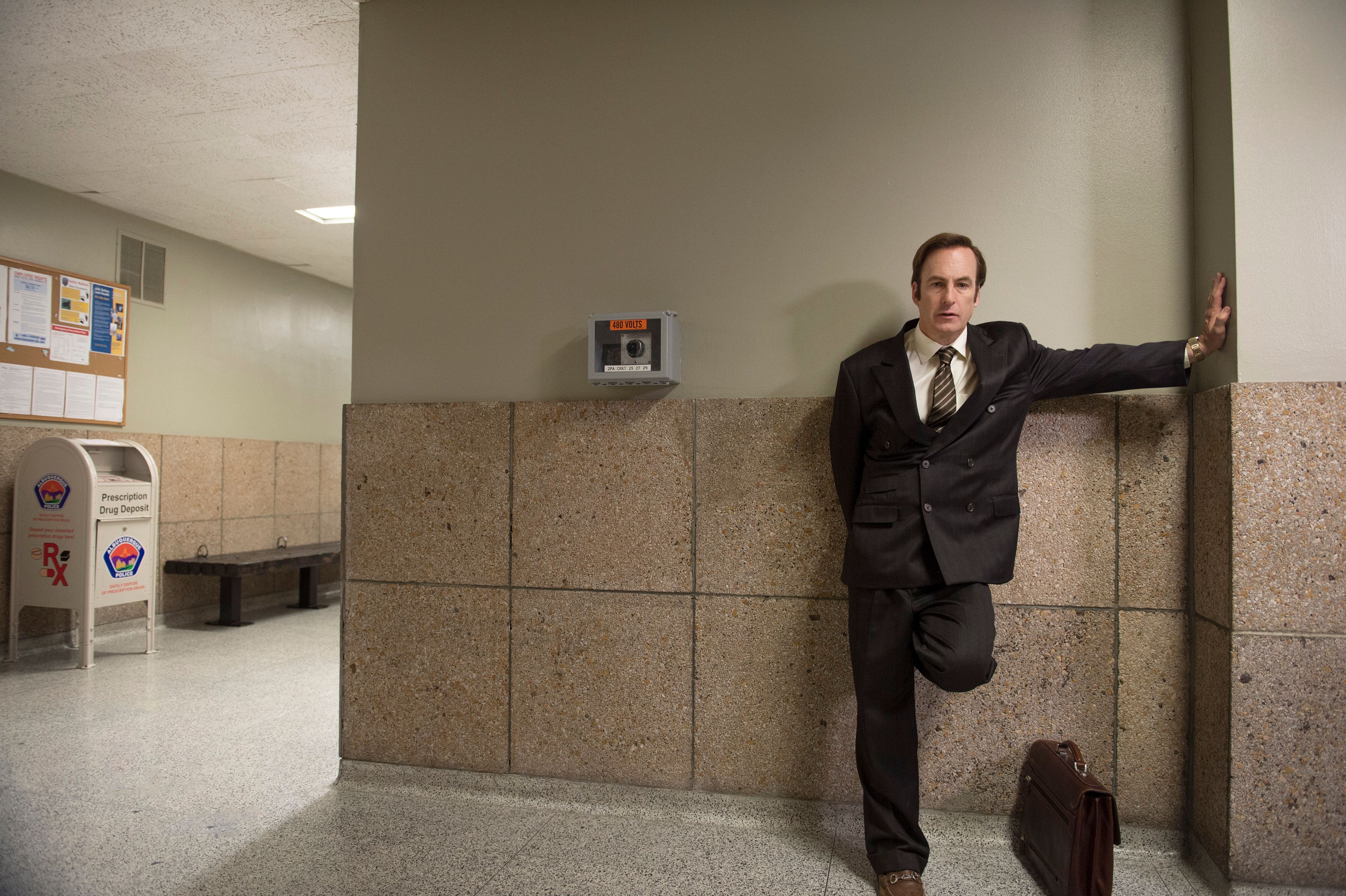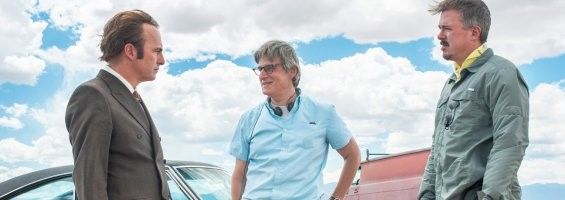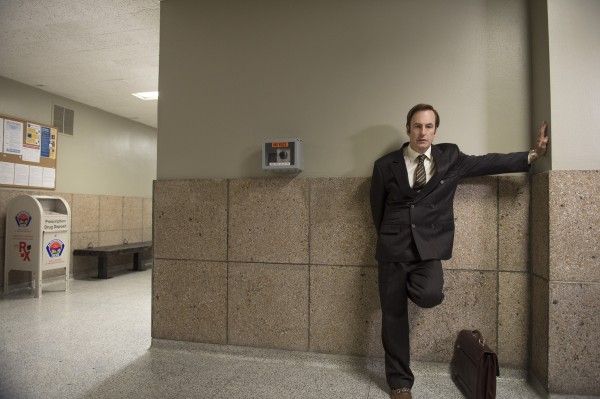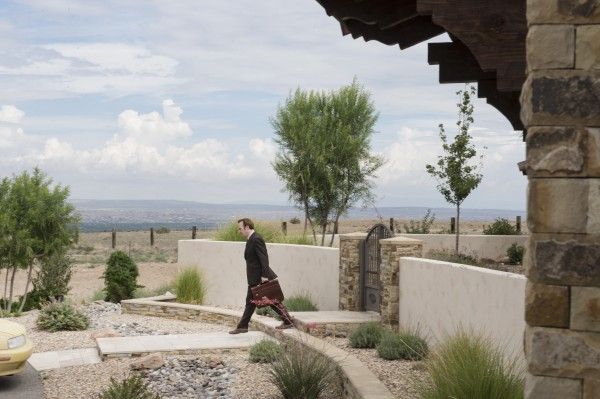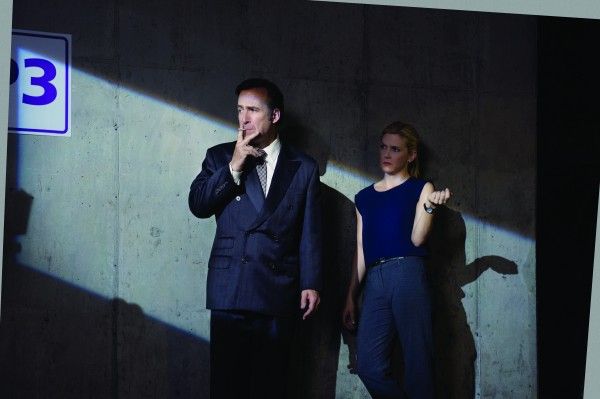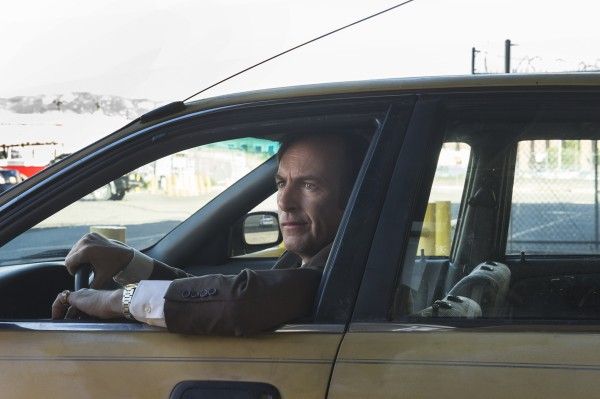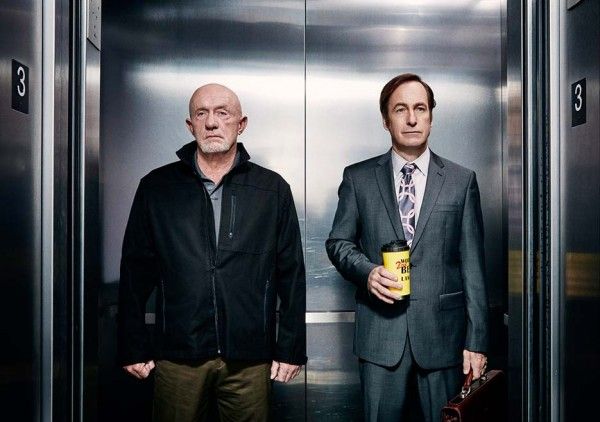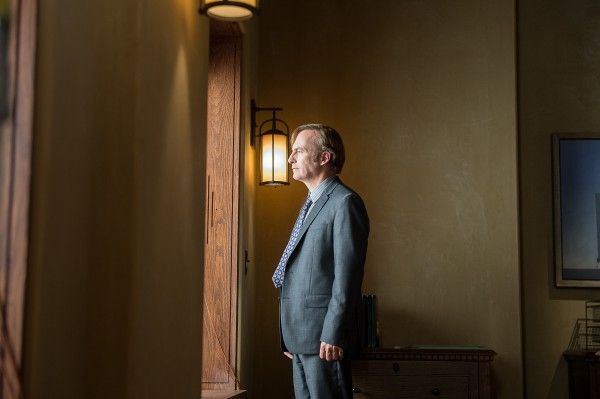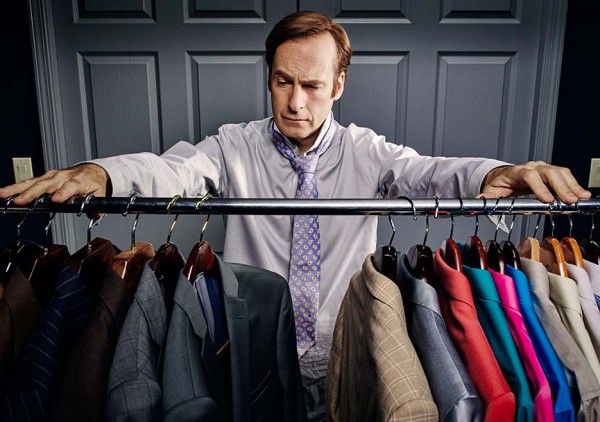When it comes to the proper use of music on television, few shows do it quite like Better Call Saul. While most programs cram as much licensed music as they can to either add weight to a scene or to distract you from the lack of substance, the team behind Better Call Saul take a “less is more” approach, which means that while the majority of the episode won’t have additional music in it, when they do drop a song in an episode, there’s a definite reason behind that piece being used. Adding on to that is the fact that they rarely use the easy needle drop; you’re getting songs dating back to the ‘50s that have more oomph to them than a current Billboard hit. So when you catch wind that a vinyl re-release of the soundtrack for Season 1 of Better Call Saul is on the way, you know damn well that it’s going to be an intriguing mix.
We got the chance to get the minds behind Better Call Saul — creators Vince Gilligan and Peter Gould, as well as music supervisor Thomas Golubić — to break down not only how both Better Call Saul and Breaking Bad approached these vital “needle drops,” but to give insight on how Badfinger’s “Baby Blue” ended up being the last song we heard during the series finale of Breaking Bad. They also give us some exclusive hints regarding the musical cues (including one particular scene) that we can expect in the upcoming sixth episode of Better Call Saul, “Bali Ha'i,” airing March 21st.
Dig into this conversation while listening to Mariachi Bandido’s “Yo Soy Saúl,” which is available on iTunes, then pre-order the vinyl version of the Better Call Saul season one soundtrack, which is out March 25th (for which we have a discount coupon code; you can find that at the end of the interview).
Gilligan broke down how vital Golubić’s role as a music supervisor on Better Call Saul (and Breaking Bad before it) is to the show:
“Thomas has this amazing ear, depth and breadth of knowledge of music -- and actually impeccable taste -- and Thomas is a storyteller in his own right. He is not just an expert on music, but he always reads the scripts and watches the finished cuts of the episodes very closely; Thomas will do his homework on the episode at hand, and he and his crew will pick the moments in the given episode. And if he thinks a song should make an appearance, where there should be music ... as an aside, as you can glean from watching Breaking Bad and Better Call Saul, we use a lot less music than most TV shows use. Most TV shows use either needle drops or composed music for both. We use music very sparingly on the show, and that is something that both Thomas and Dave Porter adhere to and they both agree to as a philosophy of that.”
“He has come to us with songs and artists that we have never heard of, and he will find stuff that is very non-intuitive or counterintuitive, stuff that we would have never seen coming. For instance in the end of episode six of this new season (Season 2) of Better Call Saul, he found the song for us ... I can’t say what happens in the scene, or too many particulars about the song, but we heard this thing presented to us and we said, “What in the…? Who is this, this is the craziest idea for a music cue.” And then as the seconds went by and we listened to it, we just looked at each other and said “god damn if this isn’t perfect for this.””
Gilligan also touched on why you hear way less music in Better Call Saul than you do in other TV shows:
“I think one of the most helpful and creative notes I have ever received was from Christina (Wayne, from AMC). She said, “I like the show, I like it a lot, but let me ask you something, why is there wall-to-wall music in this thing?” And the reason that she said that is because in my original director’s cut I had temp music out the wazoo. I brought in a duffle bag probably loaded with thirty pounds of CDs, every CD that I had in my house I put in this giant duffle bag, and I brought it to the editing room and I said to my editor “OK, put this song in this scene, and try this song in that scene” and this thing just oversaturated with music, just wall-to-wall needle drops.”
Gilligan went on to explain how Wayne challenged his perspective about having too much music, saying he was “slathering” it in a way that didn’t feel like he believed emotionally or creatively in his final product. After getting up on his high-horse about it -- as he put it -- and defending that “this is how it’s done,” he later realized she was right, and it changed his entire conception of music for the show.
“And thus began this philosophy that she really was the inspiration for on Breaking Bad and now on Better Call Saul -- we should not have wall-to-wall music because it does indeed begin to feel like you are plastering over problems, you’re plastering over cracks in the wall so to speak. Let each piece of music really count for something. I liken it to the bureau of printing and engraving, and you print way too many dollar bills, each one is worth less and less. But if you print less, each one is worth just a little bit more, and that is kind of out general philosophy on music. When you do hear music on Breaking Bad or Better Call Saul, it counts for something, and when in doubt our philosophy on both shows is to do whatever other shows don’t do. And other shows by and large are putting in music wall-to-wall, and it’s a way for us to differentiate ourselves.”
Peter Gould continued,
“Another thing we keep in mind is, will the music tell the audience how to feel about a scene? We try not to reinforce the point that the scene is already making with the music. We respect our audience, and we like it when they have to puzzle out how they feel about things, rather than having it given to them as underscore, and Thomas is just it. He is an ace at doing that, and sometimes the pieces that he uses have all these other implications and overtones on the album. There is a remake of “The Third Man Theme” in episode 105 (of Better Call Saul) which is when Jimmy going around sort of soliciting clients at this retirement home and you hear it’s not the original “Third Man Theme” from the film, it’s actually 101 strings playing “The Third Man Theme,” and it just kind of caps it all off. He just has this knack for finding things that enrich the moment without just repeating what that moment was doing in another way.”
Though Golubić does usually select the music now, Gilligan did note one of the few times he himself chose a song that ended up in the show: the last song you hear during the series finale of Breaking Bad:
“I guess a good example [of that] was “Baby Blue” by Badfinger in the final scene of Breaking Bad. That was a song I was aware of for years; I grew up listening to Badfinger and a lot of other ‘60s and ‘70s bands. I was riding to work one day, a month or two out from the end of Breaking Bad, driving to Burbank and listening to my satellite radio. I heard “Baby Blue” come on and my first thought was “this is such a damn good song. Why don’t they put this on regular radio, on the oldies station?” I never hear this damn song on the radio, and it’s so good. It’s got such a great bass hook to it -- it’s just so hooky, this song. Then I started listening to it. I hadn’t heard it in years, and I said wait a minute—'I guess I got what I deserved,' these are part of the lyrics and I thought “oh shit, this would be great the finale.””
Gould and Gilligan also painted a picture regarding the sixth episode of season two of Better Call Saul, “Bali Ha’i,” and a vital piece of music that plays into it:
“Episode 6, the first piece of music that you hear, Thomas pitched us a great song. It’s “Sleep Walk” (by Santo and Johnny). We loved the piece and we had the idea—”what if we had our own version of this and what if we got Junior Brown to play this?” I was not familiar with Junior Brown until we worked with him in season one and now I am almost a big a fan as Vince is. And we just thought, if Junior Brown recorded this … wouldn’t this be fun that Junior Brown would do this, and almost before the words had even escaped our mouths, Thomas had approached Junior, and Junior had recorded his own version with his band."
He had never done that song before which was shocking to me. He recorded this and we were a little bit nervous because we were hoping it was going to fit the picture that we had already cut and when we put it against this particular sequence it creates such magic. I think one of us said this sounds like Jimmy McGill’s soul is right here and it’s so bittersweet and it’s just so listenable. There is a moment that I am really proud of. I think we all are.”
Later, Golubic described the process of getting UK band Little Barrie to craft the title theme for Better Call Saul:
“We tried to think about what are the qualities that make Saul really unique: he has an improvisorial [sic] flair, he has a very quick-wittedness, there’s a fluency to how he does things and it just happens weirdly magically with him. At the same time, he has a working class approach to things, he’s certainly not a rich kid or somebody who has things land on him, he earns things, he’s constantly struggling and there is sort of a ramshackle quality to it. It’s almost like something that’s rough and improvisorial, but also tuneful and melodic."
"As we were thinking about those qualities, I thought about what artists really capture that and one of the ones that really came to mind first was Little Barrie partly because of Barrie Cadogan’s astonishing guitar playing and the way the band with only three instruments, it’s just a drummer, a bass player, a guitar player and voice, are able to have this wonderful sort of lurching improvisorial quality to how they work, and at the same time it feels really rough, but it’s not. It’s done so carefully and so precisely, but it doesn't feel meticulous, it feels thrown away. That to me really captures the spirit of Saul. Later on, we commissioned them to do a full length song for the soundtrack album, which I think will be a nice surprise for people who love the theme already to get a chance to hear the song.”
Golubic also spoke about the vinyl release of the Better Call Saul Season 1 soundtrack:
“It was this wonderful company SPACELAB9, who had been releasing vinyl versions. Part of what we love about both Breaking Bad and Better Call Saul, if you’re a fan of the show, you’re a very big fan of the show. People are not halfhearted about it, either it’s too slow and too abstract for them, which is fair enough -- there’s plenty of fast-paced entertainment out there - but I think for people who really like deliberate, thoughtful, carefully calibrated storytelling, it’s a really really special experience. I think those fans tend to be the kind of folks who really want momentos. The amount of ancillary products that existed for Breaking Bad is mind boggling and staggering. I think also for people who want to hear, especially music like this, if you look at the years it’s 1967, 1958, 1963, 1961, it’s a lot of older music that sort of stitches into this character and into this world and that stuff sounds so good on vinyl."
"To be able to listen to Galt McDermot’s “Coffee Cold,” which is one of those overlooked beautiful jazz-funk classics, it’s a gorgeous song. To hear the needle go on the record and to hear the opening piano strains is so satisfying. We kinda knew that for folks who wanted to hear stuff like that, or Dave Brubeck’s “Unsquare Dance,” they may not have a Dave Brubeck collection on vinyl, my hope is they’ll hear “Unsquare Dance” play and they’ll think, “You know what? Let me find out where this came from.” Pretty soon, they’re expanding their vinyl collection and sharing something that’s really unique i think listening to vinyl is a very special experience, especially if you want to extend your affection for a show or any experience, whether it’s a show or a film.”
Better Call Saul airs Monday nights on AMC. To receive 10% off your purchase of the Season 1 soundtrack, use the promo code COLLIDERSAUL at checkout.

